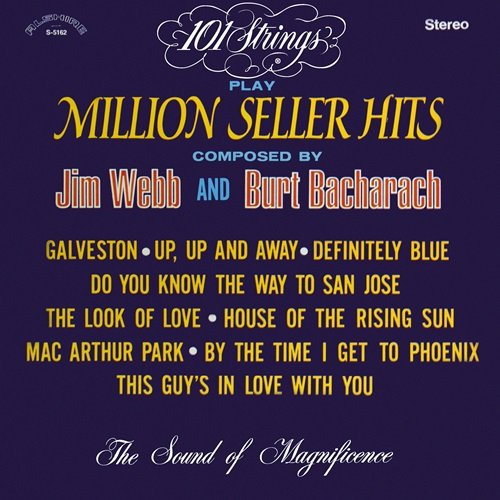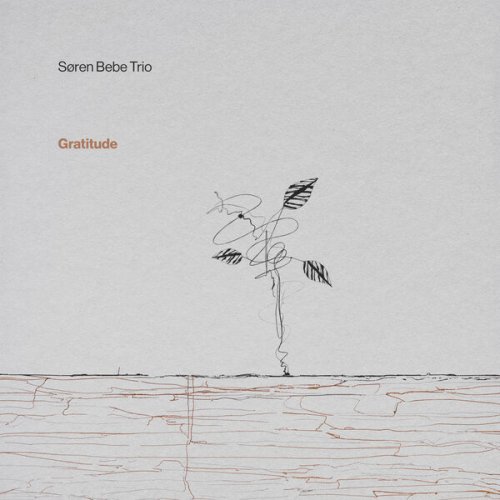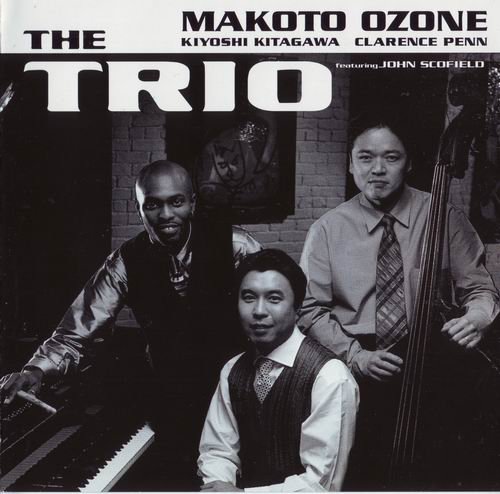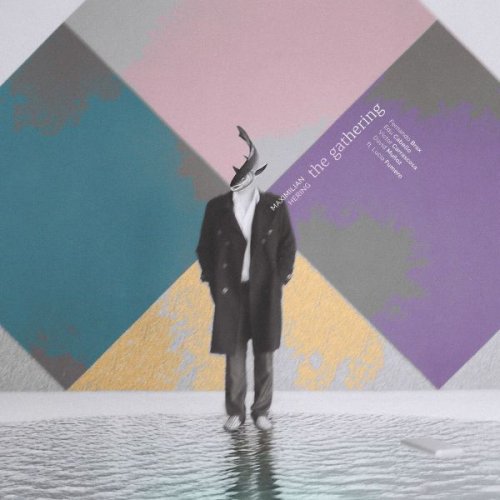Status Quo - Picturesque Matchstickable Messages From The Status Quo (Reissue) (1968/1989)
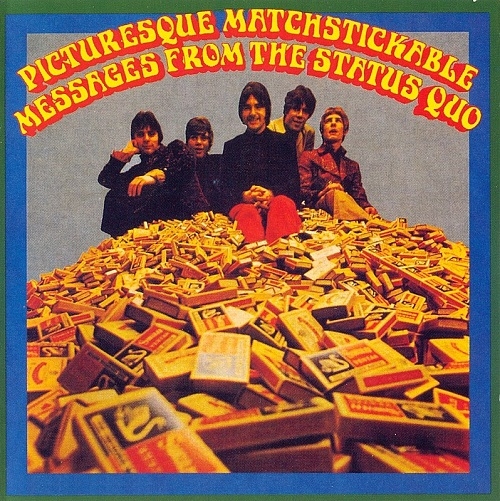
Artist: Status Quo
Title: Picturesque Matchstickable Messages From The Status Quo
Year Of Release: 1968/1989
Label: Elite / Castle
Genre: Psychedelic Rock, Psychedelic Pop
Quality: Flac (tracks, .cue, log)
Total Time: 33:54
Total Size: 229 Mb (scans)
WebSite: Album Preview
Title: Picturesque Matchstickable Messages From The Status Quo
Year Of Release: 1968/1989
Label: Elite / Castle
Genre: Psychedelic Rock, Psychedelic Pop
Quality: Flac (tracks, .cue, log)
Total Time: 33:54
Total Size: 229 Mb (scans)
WebSite: Album Preview
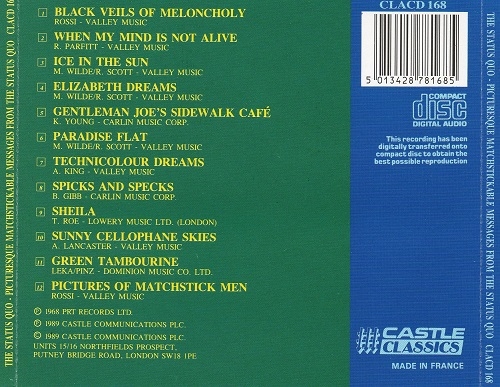
Tracklist:
1. Black Veils of Meloncholy
2. When My Mind Is Not Alive
3. Ice in the Sun
4. Elizabeth Dreams
5. Gentleman Joe's Sidewalk Cafe
6. Paradise Flat
7. Technicolor Dreams
8. Spicks and Specks
9. Sheila
10. Sunny Cellophane Skies
11. Green Tambourine
12. Pictures of Matchstick Men
Line-up::
Bass Guitar – Alan Lancaster
Drums – John Coghlan
Guitar [Second] – Ricky Parfitt
Lead Guitar – Francis Rossi
Organ – Ray Lynes
Vocals – Alan Lancaster, Francis Rossi, Ricky Parfitt, Ray Lynes
Two south London fellows called Alan Lancaster (bass) and Francis Rossi (guitar) founded the band "The Spectres" in 1962 (see The Spectres (2)). At that time, Mr. Rossi preferred to call himself Mike after one of his second names.
In 1966, the band changed their name to "Traffic", shortly thereafter to "Traffic Jam" (see Traffic Jam (5)). The lineup consisted of Lancaster, Rossi, John Coghlan (drums) and Roy Lynes (keyboard).
A year later, the band changed name once again to "The Status Quo". Rick Parfitt (guitar) joined the band. Their first hit record, "Pictures of Matchstick Men", was released. "The" was soon omitted from the name of the band, known thereafter as just "Status Quo"
In 1970, an LP, "Ma Kelly's Greasy Spoon", was released. The album showed that the band was heading towards a heavy rock'n'roll style.
Roy Lynes left the band before the recordings of the next album, although shared writing credits for one track.
The first release of an album on Vertigo came in 1972, "Piledriver" showed that Quo intended to play a heavy, guitar-dominated boogie-rock'n'roll. (A decision that made them one of the greatest bands ever.)
The release of "Hello!" in 1973 made it clear that their rock'n'roll intention wasn't an accident.
The seventies went on, with Status Quo releasing albums, of which one was the wonderful "Live".
In 1982, the band member John Coghlan quit, and the record "1+9+8+2" released this year had a drummer called Pete Kircher. Andy Bown, a keyboardist who had been playing with Quo since 1977, was from now on considered an official member of the band (As well as Kircher).
In 1984 the band announced that they were going to break up. The "End of the Road Tour" was a total success.
In 1985, the band reunited for one night to play the opening of the "Live Aid" show.
When everyone thought that the story was over, the band released an album called "In The Army Now" in 1986. The line-up was now Francis Rossi, Rick Parfitt, Andy Bown, John 'Rhino' Edwards (bass) and Jeff Rich (drums).
1986-2000, the line-up didn't change.
In May 2000, the drummer Jeff Rich quitted Quo. New drummer is Matthew Letley.
Status Quo is still going strong.
In 1966, the band changed their name to "Traffic", shortly thereafter to "Traffic Jam" (see Traffic Jam (5)). The lineup consisted of Lancaster, Rossi, John Coghlan (drums) and Roy Lynes (keyboard).
A year later, the band changed name once again to "The Status Quo". Rick Parfitt (guitar) joined the band. Their first hit record, "Pictures of Matchstick Men", was released. "The" was soon omitted from the name of the band, known thereafter as just "Status Quo"
In 1970, an LP, "Ma Kelly's Greasy Spoon", was released. The album showed that the band was heading towards a heavy rock'n'roll style.
Roy Lynes left the band before the recordings of the next album, although shared writing credits for one track.
The first release of an album on Vertigo came in 1972, "Piledriver" showed that Quo intended to play a heavy, guitar-dominated boogie-rock'n'roll. (A decision that made them one of the greatest bands ever.)
The release of "Hello!" in 1973 made it clear that their rock'n'roll intention wasn't an accident.
The seventies went on, with Status Quo releasing albums, of which one was the wonderful "Live".
In 1982, the band member John Coghlan quit, and the record "1+9+8+2" released this year had a drummer called Pete Kircher. Andy Bown, a keyboardist who had been playing with Quo since 1977, was from now on considered an official member of the band (As well as Kircher).
In 1984 the band announced that they were going to break up. The "End of the Road Tour" was a total success.
In 1985, the band reunited for one night to play the opening of the "Live Aid" show.
When everyone thought that the story was over, the band released an album called "In The Army Now" in 1986. The line-up was now Francis Rossi, Rick Parfitt, Andy Bown, John 'Rhino' Edwards (bass) and Jeff Rich (drums).
1986-2000, the line-up didn't change.
In May 2000, the drummer Jeff Rich quitted Quo. New drummer is Matthew Letley.
Status Quo is still going strong.


![Mimika Orchestra - Medzotermina (2025) [Hi-Res] Mimika Orchestra - Medzotermina (2025) [Hi-Res]](https://img.israbox.com/img/2026-02/02/vi2nypd84ymca2vap8s28zj4d.jpg)
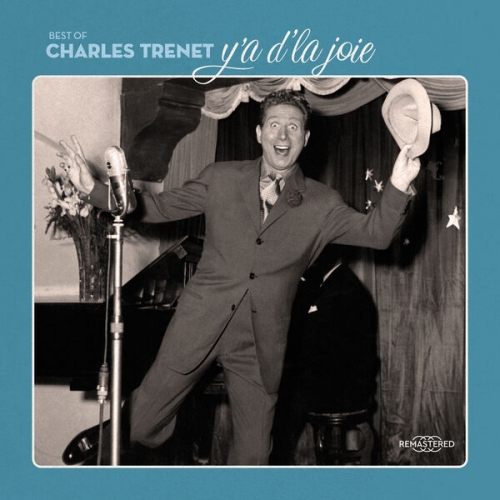
![Heisenberg Uncertainty Players - Return to the Enchanted Forest (2026) [Hi-Res] Heisenberg Uncertainty Players - Return to the Enchanted Forest (2026) [Hi-Res]](https://img.israbox.com/img/2026-01/31/tgq378zpwy9e3lh1p4simyihf.jpg)
